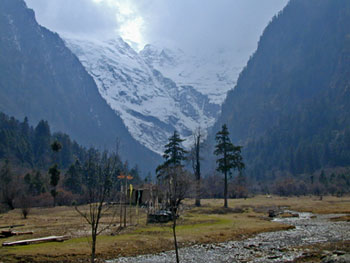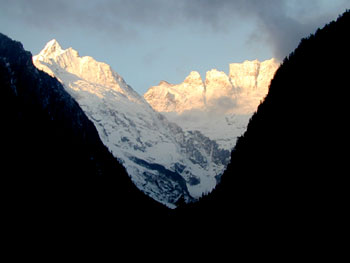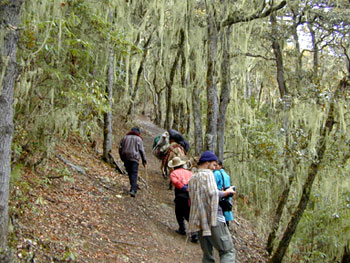A Village Near the Sky
Greater Tibet (Yunnan, China), 2002
Part 3 of 3
Go to: Part 1 - Part 2 - Part 3
[Full story also available as a PDF download]
“The middle tree died about five years ago,” explains one of the men sitting in a circle in the courtyard. He refers to one of three firs which stand at the foot of the valley, its denuded branches silhouetted against the snowfields on Meili. “Since then, bad luck has plagued us. This year we don’t have enough water. A hundred mu of wheat have already dried  up. We will try to replant with potatoes. But we don’t know whether we will have enough food.”
up. We will try to replant with potatoes. But we don’t know whether we will have enough food.”
The village struggles with a mix of private and collective enterprise. The fields are individually-owned, each family benefiting from the produce that grows on its land. Behind our guest-house, however, several men have hitched three pairs of yaks in a single field. They are cooperatively plowing and planting, working together much better than each animal with its mate. The pairs strain in opposite directions at the turn at each furrow’s end. Small businesses are also family-run, like the guest rooms that Ahqing and Ana Zhu have added on their properties. Horses and donkeys are raised privately. But the work rotates among the drivers when pack stock are needed, dispersing the money received. Familial links interwoven throughout the community reinforce the cooperation, which culminates with the forest. The natural resources harvested there are collectively owned and managed.
“We need a road,” asserts another member of the circle. “No transportation is why we are so poor.” Although Ana Zhu had estimated that the village splits evenly among the alternatives, we are becoming convinced that the desire for a road is predominant. Despite his own objections, Ahqing agrees with that assessment.
“The people in Xidang earn good money working on the road,” a third man argues, referring to the town lying at the nearest roadhead. “We would like to get jobs like that, but we have no opportunity.”
The men are expressing the concerns of villagers trying to keep their children alive. A better link with the outside world could bring in more food and medicine, perhaps jobs and possibly more people spending money. But to us the risks seem great. Losing its remoteness will probably bring less immediate danger to the village’s culture than the destruction by the Red Guards decades ago, but ultimately it may pose a greater threat. Hunting and logging bans may not guarantee preservation of the pristine natural beauty, but isolation limits how outsiders might exploit the land’s resources.
As yet, the villagers see little prosperity from tourists who will trek over mountain passes to find their unique culture and magical landscape. Ana Zhu opened his rooms six months earlier. A group of 36 Chinese descended on him one evening,  triple what he could accommodate. He lodged the overflow with relatives and friends. But we are the first westerners to arrive. Ahqing also finds most of his rooms vacant, as do the other two guest houses that have recently opened.
triple what he could accommodate. He lodged the overflow with relatives and friends. But we are the first westerners to arrive. Ahqing also finds most of his rooms vacant, as do the other two guest houses that have recently opened.
At least the investment by these aspiring innkeepers will test the promise before the village faces a decision. The Nature Conservancy is supporting the case for preservation-based tourism as a solution to Yubeng’s economic woes. The region’s biodiversity makes it a prime candidate for a national park. A related program funded by the Ford Foundation, Photovoice, is building the villager’s awareness of their culture and environment by distributing point and click cameras. The program’s participants record their life and the nature around them.
One evening, Ana Zhu brings out his Photovoice collection as we finish dinner. A crowd of men and children gather eagerly around us. The landscape of Yubeng and the people who make it their home fascinate the group. A picture of the glacial lake unveils the beauty we could not reach. The kids grab snapshots of women celebrating in bright Tibetan colors. One visitor furtively pockets a few photos that  particularly intrigue him. We flip through the album several times with no sign that interest is waning. The reaction to the scenes captured with Ana Zhu’s camera reveals a deep understanding of the unique place these people live, raising our hopes.
particularly intrigue him. We flip through the album several times with no sign that interest is waning. The reaction to the scenes captured with Ana Zhu’s camera reveals a deep understanding of the unique place these people live, raising our hopes.
We leave the village after five days. Donkeys are carrying our packs. Their weight would not pose too much of a burden on our shoulders, but the drivers can use the few bucks that the animals cost us. Maybe this source of tourist dollars will push a few more people toward the side of preserving Yubeng’s remoteness. As we climb toward the pass to Xidang, a high-pitched whine fills the valley behind us. Although we saw no sign of mechanized devices during our visit, a chain saw has just cranked to life. We fear what it could mean to life in Yubeng.
Go to: Part 1
Bill's Books
A Novel of New Amsterdam
The Mevrouw Who Saved Manhattan
"[A] romp through the history of New Netherland that would surely have Petrus Stuyvesant complaining about the riot transpiring between its pages."
- de Halve Maen, Journal of the Holland Society of New York

